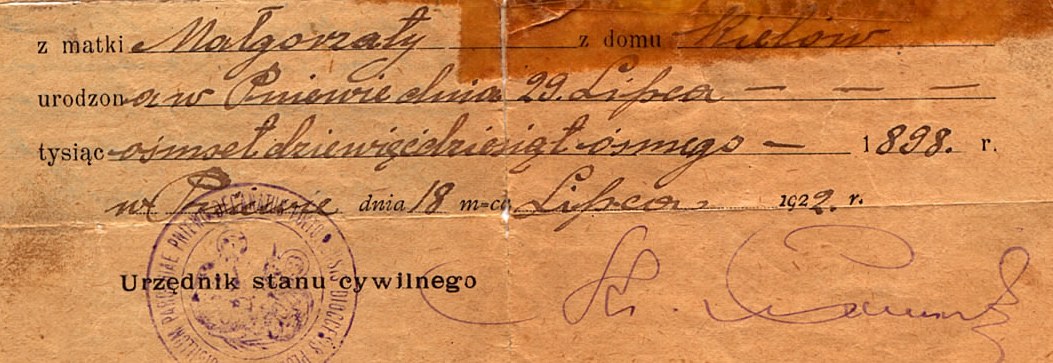z Kielow - this is a perfectly normal form to indicate that the lady came originally from the house of Kiela. This form remains until today, many times in funeral notices you see this form.
Well, this is nothing new in Polish language. The form "z domu", "de domo" (Latin), "née" or "nee" have been in use for centuries in Poland. However, the typical usage would be - as in this case, "de domo Kiela", " z domu Kiela", "nee Kiela" - in the singular, nominative case, not "z domu Kielów". The only grammatical exception from such rule would be to indicate the femininity of the person, whenever appropriate; as in "de domo £abuńska", rather than "de domo £abuński".
The plural declensed expression "de domo £abuńskich", or " z domu Kielów" is actually incorrect, even though it might sound logical. This is why I tried to justify the transition Kielów=>Kiela in my previous post, by providing some auxiliary supportive evidence.
As a form of amusement, here is what the uncle Google found: An early 19th century advertisement with the word "Kielów". I corrected some of the spelling caused by errors of optical character recognition (OCR) firmware, but I have left the ancient spelling intact, otherwise.
Jakób Czerlo.
Niżey podpisany podaie do wiadomości każdego, kogo to dotyczeć może, iż zyiąc w separacyi z Żona moią Rachłą Netsencederborr, nie należę do iey handlu, będącego przy ulicy Królewskiey w domu KieLów pod Nrem 1076 w sklepie Nro 5, i ze na mocy układów między nami zawartych, ona sama tylko obowiązana iest zapłacić długi tak w kraiu tuteyszym iako i za granicą.
I undersigned Jakób Czerlo notify everyone, who might be concerned about it, that - being separated from my wife Rachła Netsencederborr - I am not part of her business, located at 1076 Królewska Street in the
Kielas House, shop no 5, and that according to our arrangements she is alone obliged to pay back her debts both in this country as well as abroad.

 PolishForums LIVE / Archives [3]
PolishForums LIVE / Archives [3]